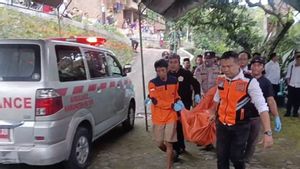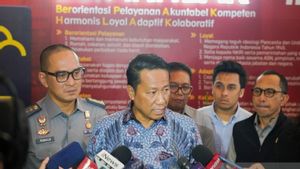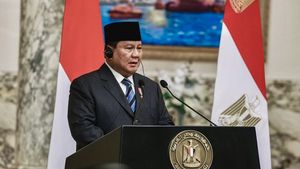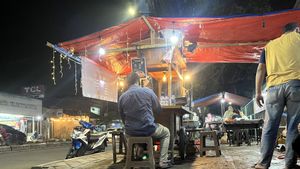JAKARTA - The number of positive confirmed cases of COVID-19 that has exceeded one million is expected to be a whip for the government to be more massive in carrying out 3T or testing, tracing, and treatment.
After attending a limited meeting with President Joko Widodo (Jokowi) and a number of other officials, Minister of Health (Menkes) Budi Gunadi Sadikin spoke about the total number of COVID-19 cases in Indonesia which had exceeded 1,012,350 after the addition of 13,094 cases.
He said that all parties should start to reflect on this and make the public mourn the loss of their closest people to the loss of hundreds of health workers who are struggling in the midst of the COVID-19 pandemic.
"This is the time for us to mourn because there are many of our relatives who have died and more than 600 health workers who have died in the face of this pandemic," Budi said in a press conference broadcast on the YouTube account of the Presidential Secretariat, Tuesday, January 26.
Furthermore, in an effort to suppress the COVID-19 case in the country, Minister of Health Budi has prepared a number of strategies. First, Budi requested that all people without exception be disciplined in implementing health protocols such as wearing masks, maintaining distance, and washing hands.
"To reduce the rate of transmission of the virus. We must be very disciplined in wearing masks, washing hands, maintaining distance. This is very difficult and cannot be done alone," he said.
The second strategy, he said, said that the Ministry of Health would strengthen testing and tracing in the community. Testing, he said, must be carried out on people suspected of being exposed while tracing is carried out so that tracing of case transmission can be carried out.
The third step, the Ministry of Health ensures that it will prepare a comfortable isolation area. Thus, exposed people can isolate comfortably without causing virus transmission in the community.
With this strategy, the government hopes that the baseline for COVID-19 cases can be implemented so as to reduce the burden on health facilities.
"We at the Ministry of Health will work hard. Very hard to ensure that we can carry out independent testing, tracing and isolation programs and execute them well. The goal is only one, reducing the rate of transmission or flattening the curve so that we can control the spread of this pandemic. , "he said.
The total number of cases of 1,012,350 is a calculation from the discovery of the first COVID-19 cases in Indonesia.
In the midst of being relaxed by the Indonesian government in facing a virus attack that originally originated in the city of Wuhan in China, suddenly two residents who live in Depok were exposed to COVID-19. Both of them were exposed after interacting with Japanese citizens who had already been exposed.
The Minister of Health at that time, Terawan Agus Putranto, explained that the two residents who were exposed to COVID-19 for the first time were a mother and child who had close contact with the Japanese citizen during an event. At that time, they both experienced symptoms of cough, flu, breathlessness and fever before receiving treatment at RSPI Sulianti Saroso, Jakarta.
After these two cases, Indonesia has finally continued to experience additional cases of COVID-19 and has not shown any signs of sloping down even though a number of methods have been implemented, starting from the imposition of large-scale social restrictions (PSBB) to the most recent imposition of restrictions on community activities (PPKM) in the Java region. -Bali.
3T is urged to be improved more than ever
Epidemiologist from Australia's Griffith University Dicky Budiman responded to the achievement of 1 million COVID-19 cases in the country. He said, with this figure, the government should not only invite people to reflect but also carry out 3T strengthening or testing, tracing, and treatment in the community.
"Now is not the time to reflect but now is the time to act, respond because this situation is very serious. Very serious," said Dicky when contacted by VOI.
The 3T steps, especially testing and tracing, continued Dicky, must be done immediately to detect COVID-19 cases in the community. Moreover, he considered, the number of COVID-19 cases in Indonesia was actually more than the data owned by the government and this could happen because many cases were not detected.
"So this 1 million case is a case that has not just reached 1 million. This has happened around August-September 2020 and then actually 1 million of our cases. This is actually caused by our low testing capacity which causes us to only be able to detect that much, when looking at modeling. Currently, at least one percent of our population has been exposed or about 3 million less, "he explained.
In addition to increasing the 3T that must be strengthened, there are several other things that need to be done to reduce the number of COVID-19 cases in the country, such as implementing strict social restrictions in the Java Island region and implementing restrictions on community activities (PPKM) in other areas.
"Then strengthen health protocols. No more neglect in limiting mobility. Build an appropriate, effective risk communication strategy. Next, focus on creating a comprehensive national strategy that has strong targets in the short, medium and long term so that it is clear," he said.
"However, this strategy still has to focus on health and not be distracted by other goals so that it is not half-hearted like what has happened today," added Dicky.
Apart from Dicky, Secretary General of the Indonesian Hospital Association (Persi) Lia Gardenia Partakusuma also asked the government to be more serious and compact in facing the COVID-19 pandemic in the country. This is important to prevent more victims from the health workers.
"Hospitals or health facilities are only the last bastion of the journey of COVID-19 patients, the vanguard is the community and all government and private efforts. So Persi asks all ranks in Indonesia to be more compact in tackling the spread of COVID-19," said Lia.
"Society, government, world health, business world, security, and others must have risk mitigation in their respective activities," he added.
Apart from preventing the increasing number of victims, especially from the health workers, firm government steps must be taken to maintain the availability of hospitals for patients.
"The hospital endures as hard as it can to help. But if you get more worried there are times when the patient cannot be treated in a place where it should be, and maybe even unable to accept the patient again until the patient who was treated earlier in the hospital recovered and returned home or passed away," he concluded.
The English, Chinese, Japanese, Arabic, and French versions are automatically generated by the AI. So there may still be inaccuracies in translating, please always see Indonesian as our main language. (system supported by DigitalSiber.id)









